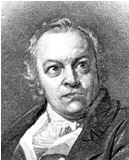Songs of Innocence and Experience by William Blake
Page 9 of 18 - 1 2 3 4 5 6 7 8 9 10 11 12 13 14 15 16 17 18 Purchase full notes for £5.95 (aprox $9.28)
Introduction: William Blake’s Vision of Experience
The Marriage of Heaven and Hell , completed by Blake in 1793, while he was composing the Songs of Experience , includes the following lines:
If the doors of perception were cleansed every thing would appear
to man as it is, infinite.
For man has closed himself up, till he sees all things thro' narrow
chinks of his cavern.
Blake’s aim in his Songs of Innocence and of Experience is not dissimilar. Instead of actual debate, the manner in which the reader engages first with a vision of innocence , then later with one of experience , challenges preconceptions and received ideas with paradox after paradox, so that our ‘doors of perception’ are prized open. A key point about Blake’s doctrine of ‘Contraries’ is that both positions are necessary to a true understanding. This is made clear from the outset in The Marriage of Heaven and Hell : ‘Without Contraries is no progression. Attraction and Repulsion, Reason and Energy, Love and Hate, are necessary to Human existence.’ All of the three pairings he gives (and, by implication, all the other possible ‘Contraries’) ‘are necessary to Human existence.’ Accepting these contraries, Blake implies, and stretching our minds by combining paradoxical and contradictory thoughts, allows us to glimpse the ‘infinite.’
While this may seem a strange form of dialectics at first, it is interesting to note that there are actually numerous analogies to this mental process in the religious practices of the world – the use of koans in Zen Buddhism, for example, provides quite a close parallel. To see how it works in practice, however, it is necessary to examine Blake’s concept of experience in more detail.

